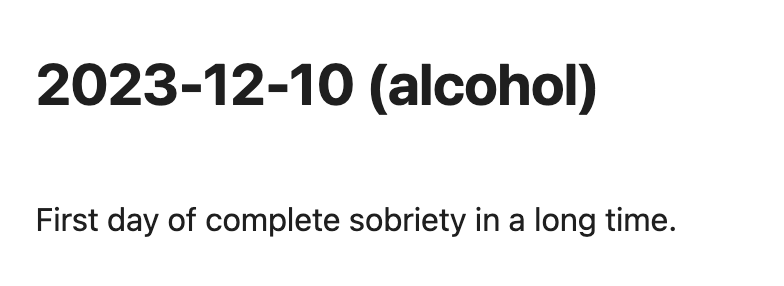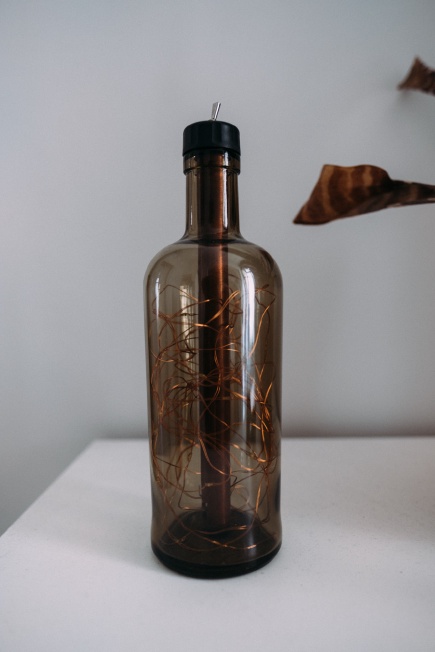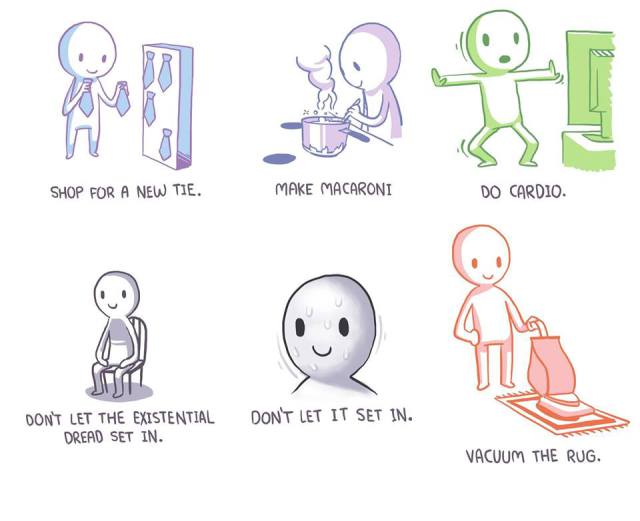Sometime late in 2023 I decided that my alcohol consumption was becoming a problem.
I don’t have an exact date for when I realised. I remember making a wry joke to a friend about it one night – we were standing in the rain at a gallery opening, and he said something about how it seemed like I really had everything together and that life seemed super exciting, and rather than let the moment land, I said something like “ehh, maybe, I think I’m also a high-functioning alcoholic”.
Saying that – even as a self-deprecating joke, even as one made easier by the fact that I’d had a couple of glasses of wine that night – made it possible to start to see that I needed to do something about it. But it wasn’t til a heavy binge on a couple of consecutive weeknights afterwards that I decided that something really, really needed to change.
Quitting kinda just snowballed from there. On December 10th, 2023, I decided not to drink anything until Christmas.

Journal Entry from 10 December 2023. That’s it, that’s the whole entry.
And then, after Christmas – realising that I still wasn’t done.
I said goodbye to a loved one after a party on Christmas Day, and she asked how I was planning on spending the evening. I said “I think I’m going to go read and have a glass of wine”, and she said, “are you sure?”.
That was an accidental, but incredibly useful intervention.
Being honest with yourself is like 90% of the journey probably
In retrospect, I’d been worrying about alcohol use for a while – I remember, sometime in early 2016, going through a breakup, drinking two (tiny, Australian-sized) beers almost every night and thinking “oof, I need to do something about this”.
And then not really having any problems from 2016-2019; I had a whisky collection sitting on a shelf at one point and I remember being annoyed at how long it took to get through one specific bottle. I wanted to turn it into a lamp and needed to empty it first.

There are three double-A batteries in the copper pipe in the middle and that’s a string of fairy lights crammed into the bottle. You’re just gonna have to imagine that it’s beautiful when it’s switched on.
And then late 2019 in Berlin, worrying about a partner a continent away, and writing that it was “hard to get to sleep without a whisky or Netflix”. And in 2020, lonely-ish in New York, starting to worry about my consumption again, and downloading an alcohol tracking app. Setting a limit of 8 drinks a week, and finding it difficult to stick to.
From 2019-2023, shame was an anchoring factor – I didn’t want housemates or partners to see how much I was drinking, despite not having any information about whether they’d judge me for it or not.
But it got real bad in 2023 after a breakup – living alone meant that I didn’t have the shame to hold me back. I think before I really decided to do something about it, I’d had three alcohol-free days all year. I know it was bad because I switched to a digital journal at the start of 2023 and I can search for it; the results are depressing. The phrase “need to cut back on alcohol, let’s do a month alcohol free” shows up on the 9th of January (a whole year before I actually did anything), and then on the 13th “I can’t remember the last time I’ve had a day without alcohol” and on the 18th:
On the way home, I thought, ok I will go to the Späti [late store] and buy one beer. And then it was 10pm and I was still very sober and thought “hmm another beer would be nice”, but the process was: it’s embarrassing to go back to the Späti and get a second beer. That makes me look like an alcoholic. This is silly? I went looking for other spätis, but there are none nearby, there is just the one. Well, there is another, but it’s further away and I’d have to walk past the one I bought the first beer from.
(I remember this feeling as a pattern in previous years, too).
And then Feb 28th:
Brain is restless today, I’m going to blame it on the alcohol last night (a whole bottle of wine)
And then consistently notes like that, throughout the year. Sometimes months apart. More frequently, spaced out by a week or so.
My decision to take a break from alcohol coincided with performance review season at work. As part of my work’s performance review process, you have to write down everything that you’ve achieved in the year, and I realised that I hadn’t really achieved very much at all – I think in large part because I hadn’t been able to muster the focus that I need for the job. It was pretty surreal to so directly see the consequences of my actions like that.
The problem isn’t the alcohol, but the alcohol makes it so much worse
The root problem wasn’t the alcohol – it was something deep-rooted and personal, and something that I still don’t understand fully. Like a disquiet and a lack of self-acceptance or self-love or something. I sometimes joke about it as existential dread (I know it’s a cliché, but the label is useful).

Don’t let it set in (Blue Chair comics)
The alcohol is a distraction, it lets you avoid the problem and even the feelings1. The thing is, the next morning, you wake up, you’ve lost all the hours, and the existential dread hasn’t actually gone anywhere. In addition, you’ve got a crazy hangover, which makes it hard to focus, which (for me) makes it harder to do good work, which contributes more to the existential dread.
Because it’s not actually about the alcohol, really, I found it really difficult to google for advice that resonated – there are lots of websites talking about how alcohol is evil, and the only option is complete abstinence, and they often with some uncomfortable religious undertones mixed in. And I’m not an idiot, I know that alcohol is… unhelpful, rather than evil. And not even entirely unhelpful; it does genuinely feel like there are some useful functions: my ability to speak German improves substantially after exactly one beer. The inhibition-lowering effect is tremendously powerful, and that can be very helpful sometimes!2 Further: I didn’t necessarily want to quit forever, entirely, just fundamentally reshape my use and get to something healthy.
Because it’s not actually about the alcohol, really – I also had to white-knuckle through some sleepless nights somewhat. I remember waking up one morning after only having gotten 3 hours of sleep because of some stray anxiety which I previously would’ve drunk away, and thinking “well this feels like shit but at least I’m not hungover, too”. There was a distinct sense of pride in that moment, and it was almost fun? rewarding? to have the new experience.
Being honest with the people around me was extremely beneficial
I didn’t notice until I started writing this, but some of my friends just… ensured that there wasn’t alcohol at dinner parties and board game nights they hosted after I’d told them I was trying to figure out an addiction. I didn’t ask, and they never said anything. It was one of the most loving responses imaginable.
Also, the taboo seemed to melt away once I started talking about it. In January, when I was completely sober and told people why, I had four different people in two weeks say “yeah, me too”, or, “I had a period like that a few years ago”. The specifics are always super different, but it’s deeply encouraging (and deeply concerning) to know that it’s such a common thing. Apparently ten-to-twenty percent of men across the US and Western Europe will have an alcohol-use disorder at some point in their lives, so it’s wild that we don’t talk about this more openly.
100 days of abstinence
Here was the strategy I took:
I had committed to not drinking at all until the end of March (about 3 1/2 months). I read somewhere that it takes people between 14-60 days to get over the hump, and decided that I was not taking any chances – staying sober wasn’t ruining my life. And I was pretty sure that it was important to really convince myself of how much better sobriety is and the longer I don’t drink, the easier it is to build up those experiences. And to convince myself that the stuff that I was avoiding – the “spooky thoughts” – didn’t have to be crippling.
Having alternatives was crucial for me. I was binging hard on nonalcoholic cocktails (my fave is Sanbitter, it’s got the same bitterness as negronis) and alcohol-free beer (my fave in Germany is Warsteiner Herb, and Wolfscraft Brutal and Dolden Null are delicious alcohol-free IPAs). I kept them stocked constantly. I quickly discovered that I used to use alcohol as a dessert-shaped thing too (e.g. have a whisky as a nightcap), and found myself craving dessert more. At some point, I started ending the night with a decaf espresso, which is the ritual I still have today.
Similarly, you need alternatives for the triggers. Binging Netflix and / or video games worked great as a distraction when I just didn’t want to be alone with my thoughts. To be clear, neither of these are ideal solutions! But they’re strictly better than not being alone with my thoughts plus feeling like shit the next day.
You need to plan ahead-of-time in social situations. This sometimes means bringing your own alcohol-free drinks to birthday parties, or checking a restaurant menu ahead of time so that you know what drink you’re going to order so you don’t just default to a beer under pressure.
Very early on, I realised that I needed to believe that I might not be able to go back to a moderate relationship with alcohol. This is a more moderate belief than “abstinence is the only strategy” and I think a more useful one – it’s more honest, and more willing to make space for possibilities. I’ve held on to this belief over the course of a year or so and made my personal “rules” stricter as a result (we’ll talk about those in a second).
The period of total abstinence lifted with a Radler / Shandy with a bunch of friends on the first hot day of the year, on March 30th. It was extremely weird that I could actually taste the alcohol as a separate thing after having associated that as a core flavour of the beer for so long.
Current strategy
My rules now are:
- Alcohol is not the default (i.e. opt for something else as the post-work relaxation drink)
- Don’t keep open bottles of wine or spirits at home
- Track it and check in periodically
- Don’t drink alone.
I’ve had a set of rules like this in place since I lifted my total self-imposed alcohol ban at the end of March. These are my current (Jan 2025) set of rules – in particular, “don’t drink alone” and the one about “not keeping open bottles of wine or spirits at home” are newer after some self-reflection and discovering the limits to my own willpower 😅. I’m sad about the “no spirits at home” one, because I used to really enjoy whisky, and could do so in moderation. But that doesn’t seem to be an ability I have anymore, so it has to go.
These rules are subject to change at any point in time – in particular, it’s still imaginable to me that at some point I might decide that I want a hard, permanent 100% abstinence rule. From what I can tell, a lot of people choose that because it’s a helluva lot less exhausting than having to check in with yourself constantly. I don’t think it’s possible to ever completely “win” from here, or get to a point where I won’t have to think carefully about my alcohol consumption, and so the question is whether it’s worth having to make decisions about it all the time.
I do think it’s fundamental to write your own rules and really own your decisions. The crux of the problem is being honest with yourself, right? Both in terms of what you’re capable of, and what’s good for you.
Why are you writing about this?
When I was first started thinking about this seriously, I found myself missing stories about people who’d also decided to rethink their relationship with alcohol, and from people who were still clearly in-progress. I’d started writing this back in April, and was inspired to pick it up again after reading A decade without drink. Stories are powerful, and we need more of them.
Also – the tricky thing about alcohol dependency seems to be that:
- it’s much easier to intervene the earlier you catch it
- it’s also much easier to hide the behaviour when it’s moderate, which means that the people who love you are unlikely to intervene for you.
This means that the best way to catch it early and be sure that it doesn’t turn into a really big problem seems to be something like introspection and self-honesty. Which are hard things, even if you’re not using alcohol to avoid doing them. I’m being blunt about my experiences here because I think if I’d read something like this earlier, I would’ve tried to do something about it sooner.
Should I do something like this?
You don’t have anything to lose by trying it3! Dry January is happening right now and the materials from Alcohol Change UK seem good.
Otherwise, further resources:
In Berlin, the Suchthilfe (addiction help) publishes this brochure (pdf) which has details on which help points speak English (page 5).
In Australia, the Dept of Health has good starting points. This podcast recommends talking to the Alcohol and Drug Information Service (ADIS), which you can find by searching for “ADIS” followed by your state (here’s details for NSW).
This article opens with the author saying “it’s not about the alcohol”. ↩︎
Also in this category for me: bolder interior design choices, furniture purchasing decisions, and publishing blog posts 😅. ↩︎
But, note that withdrawal symptoms can be deadly if you’re drinking enough – if you’ve got any doubt then your next step should be talking to a doctor. ↩︎